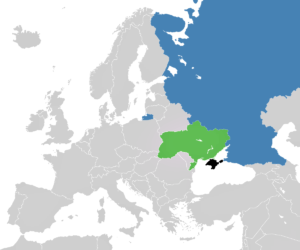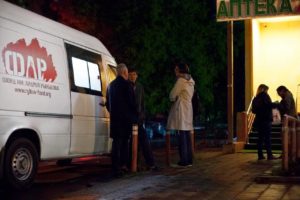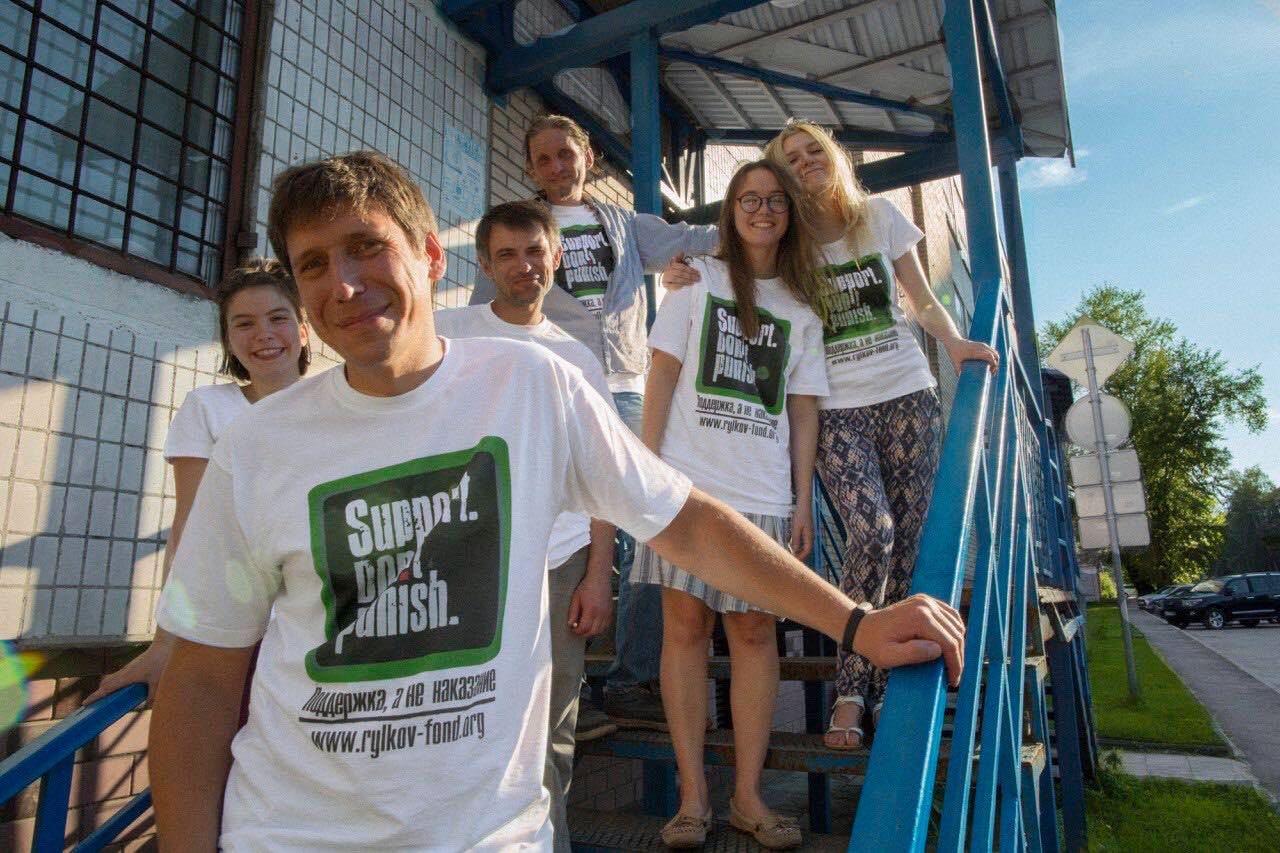“It used to be that you’d be walking on your way to score, and if you’d see a policeman, you’d give them three hryvnia [about 10 cents], and they’d tell you to wrap your business up quickly because undercovers were about to bust the spot,” says Sasha, a 40-something heroin user from Crimea (formerly Ukraine).
In 2014, as the Ukraine crisis erupted, “little green men” started popping up across the Crimea—a Black Sea peninsula the size of Maryland dangling off the south of Ukraine. A “referendum” was held in which 95.5 percent of the population apparently backed joining the territory up with Russia. In the political surprise of the century, Vladimir Putin later admitted that the mysterious strangers in green uniform were Russian troops.
Crimea’s history—and tensions reignited this week with the Russian capture of three Ukrainian naval vessels—is complicated. For all the international outrage, the 2014 change in power was relatively bloodless. But for one group of people, it was life-or-death.

Russia, Ukraine (green) and Crimea (black)
Once Crimea went under Russian control, the territory’s “registered drug addicts” found themselves cut off from their methadone supplies, which they’d previously got courtesy of Kiev. They were in for a nasty surprise when the new leadership banned their medication, in line with the rest of Russia.
“They gave it a few days, but then the feds and the Cossacks got together and came down on the dealing spots. They broke arms, legs, everything.”
Rather than risk withdrawal, many went back to using heroin, subject to dodgy doses and harsh enforcement. Within a year, over a hundred of them had died.
“At first they were humane, they gave it a few days,” Sasha tells Filter. “But then the feds and the Cossacks got together and came down on the dealing spots. They broke arms, legs, everything; it’s all on YouTube. Of course the heroin was still there—just the price went up two, three times.”
“Actually, the price of everything went up,” he continues. “We grow grapes over here but it’s cheaper to buy grapes in Moscow! And then all these Chinese [bath] salts started flooding in, and that shit kills people. But hey, at least Crimea’s ours, right?”
(Sasha isn’t being ironic. He actually supports leaving Ukraine, as do most ethnic Russians in Crimea. I told you it was complicated!)
Hardliners and Heroin
If you had to choose among all the countries of the world to be a regular drug user, Russia would be near the bottom of the list. The Philippines under President Rodrigo Duterte might be worse, but short of actually gunning down people in the street, Russia is about as bad as it gets. The country also has one of the highest populations of injecting drug users in the world.
How did these two situations come about?
Priests and their fellow cultural conservatives now have an inordinate influence over public health and society.
After the fall of the Soviet Union, Russian crime rates went up, wages and life expectancy plunged, and society itself seemed on the brink of collapse. In this context, heroin started being smuggled in huge quantities through the “Northern Route”—a reincarnation of the old Silk Road by which dope makes its way from Afghanistan via parts of the old Soviet empire (Kazakhstan, Kyrgyzstan, Uzbekistan, Tajikistan, Turkmenistan), greasing corrupt officials’ palms along the way.
Since the wild old days of the 1990s there’s been a revival of conservative nationalism in Russia. Vladimir Putin, a God-fearing Orthodox Christian, has embraced the Church as a symbol of Russian nationhood, as it was in tsarist times. Priests and their fellow cultural conservatives now wield inordinate influence over public health and society.
Their positions on sex, drugs and rock n’ roll have echoes of the Catholic stance on contraception (one that has worked out so well for Africa). Finding common ground with Russia’s Soviet-era understanding of addiction—known as “narcology”—they promote abstinence, and abstinence only, from all illegal substances.
Current Russian drug laws are predictably draconian, and the Kremlin has overtaken its arch-nemesis, the White House, to become the champion of international efforts for a “drug-free world.”
But the Just Say Nyet message rings hollow if you’re already sat behind a dive bar heating up a metal spoon.
Brave, Threatened Efforts to Meet Drug Use With Compassion
The Andrey Rylkov Foundation (ARF) is one of Russia’s very few counterpoints to that message, working to keep people alive whether or not they use drugs. But it has repeatedly paid the price for being out of step with the Russian state, and its existence is now under threat.
Its website was shut down for an article that merely discussed methadone. The authorities considered it “drug propaganda.”
ARF is the only organization doing on-the-ground harm reduction work—handing out condoms, sterile syringes and naloxone, and dispensing support and advice—in the whole of Moscow. (Similar groups exist in St Petersburg and Kazan). It’s vital work, especially when you consider that Russia is at the heart of the world’s fastest-growing HIV epidemic.
But these efforts are seldom appreciated. The organization found that out the hard way back in 2012, when its website was shut down by the government for an article that merely discussed methadone. The authorities considered it “drug propaganda.”
Even for those who prefer abstinence-based rehab, that’s not always an option. “There are few good programs in Russia, and where there are, they cost crazy money,” Anya Sarang, ARF’s president and co-founder, tells Filter. “But we think there should be options: rehabilitation, psychiatric help, some people don’t like methadone. That’s our concept. Everything has to be accessible.”
ARF also gives legal advice to people facing Russia’s unforgiving justice system, where anything over two grams of hash (cannabis) can land you 15 years’ hard time. The organization also creates an important community for ostracized people, with get-togethers and movie nights featuring some notable sing-alongs to Frozen.
But now ARF finds itself in the authorities’ crosshairs once again.

The ARF van outside its headquarters in Moscow. Credit: Ivan Reedm
This time, the offending article was a piece of safety advice the organization published in Hats and Bayan, a newsletter which they hand out to their clients.
As Sasha told us, “bath salts,” or synthetic cathinones, have become popular in Russia in recent years. They were once legal, leading many people to assume they were safe, but as with any drug, risks apply.
ARF simply recommended in its pamphlet that readers who use bath salts start with a small dose, drink plenty of water, and take vitamin C to counteract some of the more disagreeable effects. They did not recommend that anyone try bath salts.
“The government wants to strangle us with fines and we’ll have to stop everything.”
Nevertheless, on October 26 a Moscow court hit them with a 800,000 ruble ($12,500) fine for publishing drug propaganda.
Fines large enough to cripple small organizations are the state’s latest tactic against groups that don’t toe the party line. Novoe Vremya, a liberal opposition magazine, was also fined in October. However, thanks to the generosity of its large readership, the publication managed to raise the money in four days.
The Andrey Rylkov Foundation’s situation is trickier. They’re a small NGO working with some of the most alienated and disenfranchised people in Russian society: drug users, former prisoners, sex workers and LGBTQ folks. They don’t get any government grants, for obvious reasons, and funding from abroad has only just been enough to keep them afloat. Their only hope is for their fundraiser to get the money together by the end of the year.
“It’s hard to say what will happen in the future,” says Anya Sarang. “We really want to carry on, but of course the government wants to strangle us with fines and we’ll have to stop everything.”
That means no more sterile syringes, no more naloxone, no more heart-to-hearts or sing-alongs to Frozen. In a country that’s already one of the worst places on earth to be a drug user, this is one grim prospect.
The main image shows volunteers and clients at the Andrey Rylkov Foundation. Credit: Ivan Reedm





Show Comments